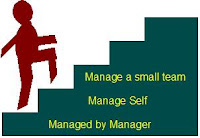Last week I read a blog by a young sales professional from Kerala - the southern-most state of India. He had only 3 posts on his blog, the last one of them written 3 years ago. This young salesman had passed out (in his own words) from a ‘2nd rung Business School. Like any other youngster, he had started with big ambitions -
Year 0 – frontline
Year 3 – Territory Manager
Year 5 – Area Manager
Year 7 – Regional Manager
Year 10 – National Sales Manager and
Year 15 – CEO
 But 5 years down, he was still in frontline, not having found his footing, unsure of what the future held for him, and completely depressed. His only thought – survival. Somehow manage to meet quota and targets week after week, month after month just and keep afloat. Depressed. Looking for a change in job, hoping something will “happen” in the next assignment.
But 5 years down, he was still in frontline, not having found his footing, unsure of what the future held for him, and completely depressed. His only thought – survival. Somehow manage to meet quota and targets week after week, month after month just and keep afloat. Depressed. Looking for a change in job, hoping something will “happen” in the next assignment.What went wrong? Why did this B School graduate not make it? I saw two possible reasons.
1.His ambition was manifest in years, and not in what he aimed to learn in those years.
2.His manager did not help him learn.
Last week I commented on one's readiness for a job promotion. This week I am presenting a perspective on the first 3 positions in a salesperson’s career.
Level 1: Frontline: This is the SELF DISCOVERY stage. Constant probing, a child-like inquisitiveness and a huge learning appetite are crucial. This is where your Corporate personality begins to take shape. A good manager will coach and mentor you through this stage. Importantly, this is the time to discover your strengths and areas for improvement. In your future career, using your strengths and taking up assignments which are best suited to your strengths will make you immensely successful. Once you complete this self learning, you are ready for the next challenge.
 Level 2: Self manager: Often called a territory manager. This is the time to start applying your knowledge about Self and Market. Remember the first time your dad let go of you while teaching you to ride a bicycle? You learned self-balance, you understood that you could do it on your own. Your dad just kept giving you a few tips from the distance. Learn to take decisions and own up responsibility of customers, territory and actions. In my second post about “bridge”, I had mentioned that one of the strong foundations is Self-discipline. This is the time to build that foundation. The stronger your foundation of self-discipline, the easier you will find it to Manage Self. Becoming a master of managing oneself and building a strong empathy in the process is an essential skill before moving on to higher ground.
Level 2: Self manager: Often called a territory manager. This is the time to start applying your knowledge about Self and Market. Remember the first time your dad let go of you while teaching you to ride a bicycle? You learned self-balance, you understood that you could do it on your own. Your dad just kept giving you a few tips from the distance. Learn to take decisions and own up responsibility of customers, territory and actions. In my second post about “bridge”, I had mentioned that one of the strong foundations is Self-discipline. This is the time to build that foundation. The stronger your foundation of self-discipline, the easier you will find it to Manage Self. Becoming a master of managing oneself and building a strong empathy in the process is an essential skill before moving on to higher ground.Level 3: People manager or Area Manager: This is where your first challenge with people management begins. You will now carry a big dual responsibility on your shoulders for the first time
1.You are responsible for your company’s market share in your area.
2.You are responsible for inducting, grooming and developing the fresh blood entering the organization.
You will learn that you can accomplish much more through your team than you can ever accomplish alone. Making your team members more of what they are, and not clones of yourself will ensure that you have diverse talent in your team. This understanding and respect of talent alone can help you take on higher responsibilities in the future. I have seen so many great salespeople never crossing this line. They hang on to being great salesmen, focusing on self success, little realizing that they can win only if their entire team contributes, performs and WINS. As a manager, you need to learn to GET THINGS DONE.
 Completing these 3 steps of learning is essential for a salesperson to grow. The speed at which you learn at each level will determine the speed of your growth and not how many calendar years you put in between.
Completing these 3 steps of learning is essential for a salesperson to grow. The speed at which you learn at each level will determine the speed of your growth and not how many calendar years you put in between.The only other way around this is being extremely LUCKY!!!
Sphere: Related Content






1 comment:
The professional life of a sales person can be compared to a chemical reaction, as chemical reaction can be controlled/stable reaction which involve only small amount of energy or it can be uncontrolled/unstable with involvement of huge amount of energy, which depend upon the conditions & environment of the chemical reaction.
In a similar manner, the individual who shifts from one job to another depends upon the money(energy) which he receive at another job(state of reaction) and also the working culture(environment) of the organization in which he is currently working.
In this process the Boss/manager under whom that individual is working works like a CATALYST, who control that reaction/who can guide the individual to work in the right direction and help him in both personal as well as professional growth.
Moreover if an individual get the right direction & can have a clear view of his carrier in the organization, then definitely he will convert into stable reaction from that unstable reaction.
Post a Comment